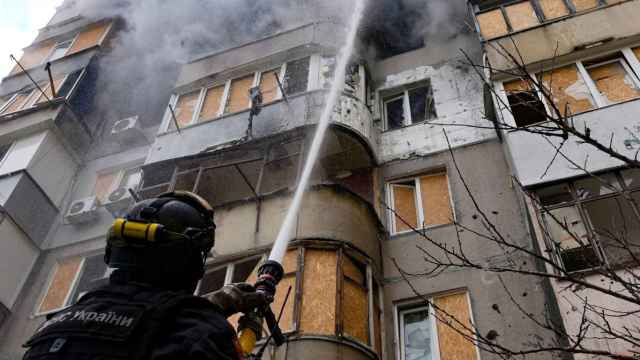German police have opened an investigation after the grave of controversial Ukrainian politician Stepan Bandera was vandalized in the Bavarian city of Munich.
A police report said Bandera's grave, which is located in the city's Waldfriedhof cemetery, was targeted sometime between Saturday evening and noon on the following Sunday.
A 1.8-meter marble cross on Bandera's grave was found nearby, while vases at the politician's final resting place had been toppled over and soil scattered about, the report added.
Munich police said Bandera's relatives and the Ukrainian consul had been called to his grave after it was vandalized.
"Many Ukrainians visit his grave regularly, so we were alerted quite quickly," a local police spokesman told The Moscow Times by phone on Tuesday.
"We are now trying to narrow down the time frame of the attack to help the investigation," the spokesman added.
Bandera, who headed the Ukrainian nationalist movement during World War II, is a controversial figure in his native homeland where some consider him a patriot, and others denounce him as a Nazi-collaborator for siding with Germany against the Soviet Union.
Bandera fled to Munich after the war ended, and was assassinated there 13 years later, in 1959, by a KGB agent.
According to Munich City Hall's 2013 census, there are 5792 Ukrainians and 7338 Russians living in the city, making the two groups two of the largest among non-EU nationalities.
Munich itself is home to 1.46 million people.
See also:
Russia's Aeroflot Investigating Pilot Over 'Ukrainian Filth' Comment
A Message from The Moscow Times:
Dear readers,
We are facing unprecedented challenges. Russia's Prosecutor General's Office has designated The Moscow Times as an "undesirable" organization, criminalizing our work and putting our staff at risk of prosecution. This follows our earlier unjust labeling as a "foreign agent."
These actions are direct attempts to silence independent journalism in Russia. The authorities claim our work "discredits the decisions of the Russian leadership." We see things differently: we strive to provide accurate, unbiased reporting on Russia.
We, the journalists of The Moscow Times, refuse to be silenced. But to continue our work, we need your help.
Your support, no matter how small, makes a world of difference. If you can, please support us monthly starting from just $2. It's quick to set up, and every contribution makes a significant impact.
By supporting The Moscow Times, you're defending open, independent journalism in the face of repression. Thank you for standing with us.
Remind me later.





